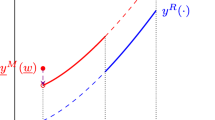Conclusion
The results of this analysis can be briefly summarized as follows. Voluntary provision of a public good may produce an unstable supply of this good in large group sizes. The primary characteristic responsible for this instability is jointness in supply. Non-exclusionary spillovers without jointness in supply do not produce a similar instability in the system.
In a voluntary situation an individual supplies a good up until private marginal cost is equal to private marginal benefit. With spillovers in joint supply the social marginal benefit is a positive function of group size. In this case, the optimum group size is unbounded. However, at some group size the adjustment by the rest of the community to a larger social marginal benefit will cause destabilizing responses to the individual provision. With spillovers in mutually exclusive consumption the size of the social marginal benefit is unrelated to group size. Therefore, the tendency for destabilizing responses to occur as group size increases does not exist.
In a voluntary setting, the supply of both quasi-public and quasi-private goods will be suboptimal. Accordingly, the attainment of optimality may suggest a reason for community-wide coordination in the provision of each good. The instability in supply of the quasi-public good provides an additional reason for coordinated group provision of this good. All other things equal, the priority for governmental action might be placed upon the provision of the quasi-public good.
Similar content being viewed by others
References
Buchanan, J. M. (1965). An economic theory of clubs.Economica 32: 1–14.
Chamberlin, J. (1974). Provision of collective goods as a function of group size.American Political Science Review 68(4): 707–716.
Fisher, F. M. (1961). The stability of the Cournot oligopoly solution.The Review of Economic Studies 28: 125–137.
Freeman, H. (1965).Discrete time systems: An introduction to theory. New York: Wiley.
Head, J. G. (1974).Public goods and public welfare. Durham, N. C.: Duke University Press.
Henderson, J. M., and Quant, R. E. (1980).Microeconomic theory: A mathematical approach. New York: McGraw-Hill. Page 40.
Hosomatsu, Y. (1969). A note on the stability conditions in Cournot's dynamic market solution when neither the actual market demand function nor the production levels of rivals are known.Review of Economic Studies 36: 117–122.
McGuire, M. (1974). Group size, group homogeneity, and the aggregate provision of a pure public good under Cournot behavior.Public Choice 18(Summer): 107–126.
Morrison, C. C. (1978). A note on providing public goods through voluntary contributions.Public Choice 33(3): 119–123.
Olson, M. (1971).The logic of collective action. Cambridge, Mass.: Harvard University Press.
Samuelson, P. (1954). The pure theory of public expenditure.Review of Economics and Statistics 36: 387–389.
Author information
Authors and Affiliations
Additional information
I would like to thank Professor B. J. Winger for his helpful comments on an earlier version of this paper.
Rights and permissions
About this article
Cite this article
Frasca, R.R. Instability in voluntary contributions based upon jointness in supply. Public Choice 37, 435–445 (1981). https://doi.org/10.1007/BF00133744
Issue Date:
DOI: https://doi.org/10.1007/BF00133744



